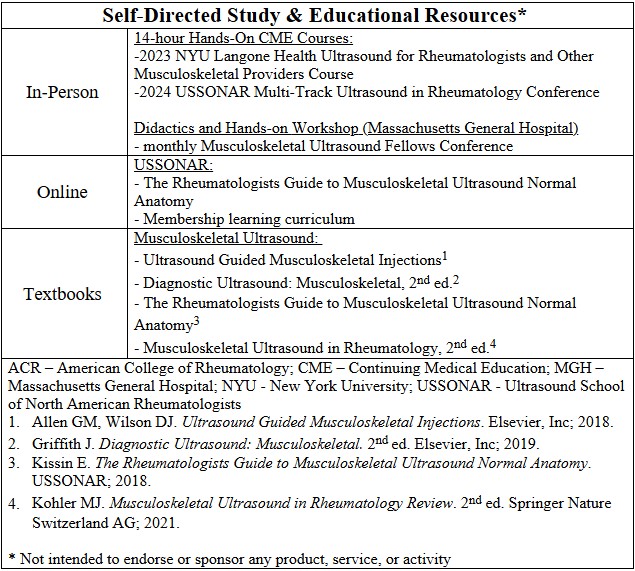Session Information
Date: Tuesday, October 28, 2025
Title: (2547–2566) ARP Posters I
Session Type: Poster Session C
Session Time: 10:30AM-12:30PM
Background/Purpose: Point-Of-Care Ultrasound (POCUS) use among Advanced Practice Providers (APPs) is expanding across health care, yet formal rheumatology-specific POCUS training remains limited. Existing POCUS curricula for APPs in emergency medicine and critical care are not tailored to rheumatology needs1,2. The American College of Rheumatology Musculoskeletal Ultrasound Certification (RhMSUS)3 is a recognized marker of competence, attainable by APPs, though only two currently hold this designation4. We developed a rheumatologic POCUS curriculum to support APP integration into an outpatient rheumatology musculoskeletal ultrasound (MSKUS) clinic and patient care access expansion.
Methods: We developed a training program for a newly hired APP within a rheumatology MSKUS clinic at an academic center. In this model, the APP was precepted by 3 RhMSUS-certified rheumatologists, starting with clinical observation, progressing to supervised image acquisition, and MSKUS-guided procedures. Procedural competence progressed from large joints to small joints, then peri-articular structures. Protected time for the APP for both in-person and online POCUS education was included, supported by a Rheumatology Research Foundation workforce expansion grant, institutional funds, and APP personal funds. Competency was assessed through objective structured clinical examinations by supervisors and attainment of RhMSUS certification. APP clinics were limited to procedural applications and were conducted adjacent to supervising physicians’ clinics for direct feedback.
Results: Together with general rheumatology training, MSKUS training was completed over eight months prior to launching independent APP clinics. The APP completed two 14-hour hands-on CME courses in rheum POCUS, attended MSKUS didactics and workshops alongside rheumatology fellows, accessed online, self-paced modules through the Ultrasound School of North American Rheumatologists (USSONAR), and reviewed MSKUS textbooks (Table 1). During this time, the APP had direct supervision of MSKUS-guided procedures in clinic. The APP achieved RhMSUS certification 10 months after starting independent practice, and 16 months after hire. Urgent patient access to the rheumatology MSKUS clinic improved to less than 2 weeks.
Conclusion: Integrating an APP into a rheumatology MSKUS practice can improve patient access and is supported by structured supervision, multimodal education, and educational funding. This framework offers a model for developing novice APPs into autonomous RhMSUS-certified rheumatology POCUS providers with procedural expertise.
To cite this abstract in AMA style:
Estes C, Yinh J, Matza M, Bolster M, Kohler M. Integrating Advanced Practice Providers into a Rheumatology Musculoskeletal Ultrasound Clinic: Enhancing Patient Access and Procedural Expertise [abstract]. Arthritis Rheumatol. 2025; 77 (suppl 9). https://acrabstracts.org/abstract/integrating-advanced-practice-providers-into-a-rheumatology-musculoskeletal-ultrasound-clinic-enhancing-patient-access-and-procedural-expertise/. Accessed .« Back to ACR Convergence 2025
ACR Meeting Abstracts - https://acrabstracts.org/abstract/integrating-advanced-practice-providers-into-a-rheumatology-musculoskeletal-ultrasound-clinic-enhancing-patient-access-and-procedural-expertise/

